-
DHS slow to crack down on ammonium nitrate sales
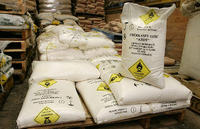
U.S. lawmakers are becoming frustrated with DHS for its slow implementation of regulations on ammonium nitrate fertilizer, a key ingredient in dangerous homemade explosives like the one used in the deadly 1995 Oklahoma City bombing; Congress initially passed legislation tightening control on the sale of the fertilizer in 2008, but DHS has yet to implement such regulations and three years later is only now publishing a set of “proposed” rule
-
-
Thales’s Liberty LMR completes Department of Interior tests
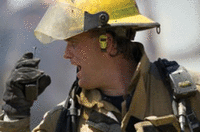
Thales’s Liberty LMR has passed U.S. Department of Interior tests; the radio had earlier been approved for Law Enforcement and Tiers 1, 2, and 3; the company says the Liberty LMR, a software-defined radio solution, enables interoperability across all public safety bands, linking government agencies and first responders with a single portable radio
-
-
Alliance urges Congress to focus on D block allocation
The Public Safety Alliance (PSA) strongly encourages Congress to stay focused on legislation that would allocate the D Block to public safety for the creation of a nationwide, interoperable first responder broadband network
-
-
Solving cold case by recovering old fingerprints
Researchers are developing a novel method for recovering old fingerprints using gold-antibody nanoparticles; the new fingerprinting method that could make it possible to recover previously unusable or undetected prints from old evidence and from surfaces long considered too difficult by crime scene investigators
-
-
Listening to the sound of bullets
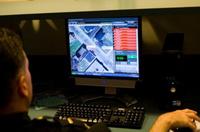
ShotSpotter systems relies on a system of acoustic sensors to identify the location from which a shot has been fired; the alerts are immediately conveyed to police dispatchers, 911 operators, and sometimes to officers in the field via laptops in patrol cars; the system includes a computer program which displays a comprehensive bird’s-eye view of the area, marking the location of the incident with a red dot and indicating the time and number of rounds fired
-
-
Research inspires robotics design for medicine, military
A pathogen that attacks the small intestines of humans and animals is serving as the inspiration for developing robots that can fight disease and aid in military operations; ror 250 years, scientists have tried to understand how the microorganism is able to attach to a multitude of surfaces and swim in harsh environments — enabling it to infect many kinds of species while most parasites have specific hosts
-
-
Blast gauge gives medics, doctors critical information
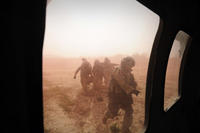
Researchers are working to enhance the safety of soldiers in the field through the development of a device that monitors the physical impacts of exposure to an explosive blast; 188,270 service members have suffered a traumatic brain injury in the last decade; the extent of injury is often difficult to discern, making diagnosis and selection of appropriate medical treatment challenging
-
-
Foreign sham marriage ring broken up
Last week fourteen people were charged with conspiracy to commit marriage fraud in an attempt to secure citizenship in the United States; the plan involved paying U.S. citizens to enter into false marriages with foreigners from Eastern Europe and Russia to legalize their immigration status; the U.S. recruits were offered as much as $5,000 to participate in the scheme
-
-
Mexican drug cartel enforcer admits to killing 1,500
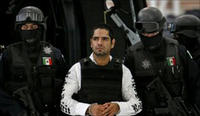
Mexican police in has arrested a drug cartel leader they say has admitted to ordering the murder of 1,500 people; Jose Antonio Acosta Hernandez, 33, known as “El Diego,” was the head of La Linea, a gang of hit men and corrupt police officers who acted as the armed wing of the Juarez drug cartel
-
-
FBI approves Neurotechnology's latest biometric algorithms
Last week Neurotechnology, a developer of sophisticated biometric identification solutions, announced that two of its newest fingerprint compression algorithms received WSQ Certification; the certification means that the FBI has verified that these two algorithms meet the accuracy requirements in its latest standard for exchange of fingerprint images within the biometrics and law enforcement community
-
-
Tampa police already training for 2012 RNC convention
In preparation for next year’s Republican National Convention in Tampa Bay Florida, nearly every local police department employee is required to attend a three-day training course; the mandatory training is designed to teach officers how to control large crowds
-
-
Filipino man guilty of selling UAV on eBay
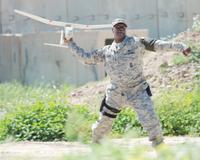
Last week a Filipino man pleaded guilty to violating arms export and smuggling laws by selling parts from an unmanned aerial vehicle (UAV) on eBay; in February, DHS officials arrested Henson Chua of Manila, Philippines after he shipped undercover agents a three-foot long, hand-launched, computer-controlled RQ-11A/B Raven surveillance drone
-
-
Turning sport vehicle into military machine
U.K. companies to transform a proven sports vehicle into a high performance, off road vehicle for special forces, border patrol, reconnaissance, rapid intervention or strike roles; the Wildcat 500 DKR boasts high speed performance in harsh environments
-
-
Where have Libya's antiaircraft missiles gone?
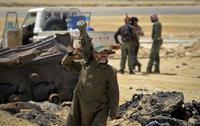
U.S. government officials fear that more portable anti-aircraft missiles may have slipped into the wrong hands or been sold in the black market after rebels in Libya raided one of Colonel Muammer el Qaddafi’s munitions depots; late last month rebels captured the city of Ga’a which contained an ammunition depot that housed Man-Portable Air-Defense Systems, lightweight surface to air missiles known as Manpads; in the ensuing chaos, the depot was raided and crates of weapons disappeared with no record of where they went
-
-
Auto theft going extinct?
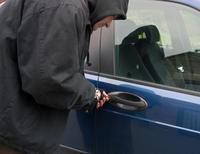
Thanks to aggressive police work and new technology car theft could eventually become an obsolete problem; new technological developments like high-tech keys, immobilizer systems, and GPS tracking have made it increasingly difficult for thieves to successfully steal cars; new police tactics and technologies like bait cars and license plate scanners have given law enforcement agencies the edge in tracking down stolen cars and catching thieves
-
More headlines
The long view
Why Ukraine’s AI Drones Aren’t a Breakthrough Yet
Machine vision, a form of AI, allows drones to identify and strike targets autonomously. The drones can’t be jammed, and they don’t need continuous monitoring by operators. Despite early hopes, the technology has not yet become a game-changing feature of Ukraine’s battlefield drones. But its time will come.
